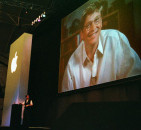In August 1997 Apple was nearly bankrupt due to strong competitions from Wintel computers powered with Windows and Pentium. At the time, Apple risked delisting from the stock market as its stock traded below $5 a share. Software companies such as Adobe announced plans to stop publishing software for the Mac. In a remarkable feat of negotiating legerdemain, the newly returned CEO Steve Jobs secured a $150 million bailout from rival Microsoft to keep the company afloat. Humbly, Apple got the badly needed cash in exchange of non-voting shares and an assurance that Microsoft would publish the popular Office software for the Mac for five years. Apple also agreed to drop a long-running lawsuit in which they alleged Microsoft copied the look and feel of the Mac OS for Windows.
At the time, Microsoft was in the midst of an image-tarnishing antitrust battle over its heavy-handed promotion of IE during the height of the browser wars with Netscape so the bailout allowed Micorsoft to look like a noble competitor. The Apple faithful were shocked when Steve Jobs made the surprise announcement at Macworld in Boston. And it came with an oddly juxtaposed satellite video feed of then-Microsoft CEO Bill Gates piped into the auditorium, dwarfing Jobs on stage. The imagery might have been unintentional but the metaphor was clear: Apple was only a tiny player of the desktop computer market, had not yet revolutionized the music industry with the iPod and couldn't possibly dare to dream it would take over the smartphone market with the iPhone. Since then Apple has sold more than 90 million Macs, 100 million iPod Touches, 250 million iPads, and 600 million iPhones.
- Parte del discurso: proper noun
- Industria/ámbito: Administración de negocios
- Categoría: Gestión de negocios
Other terms in this blossary
Creador
- scott.sf
- 100% positive feedback
(United States)






